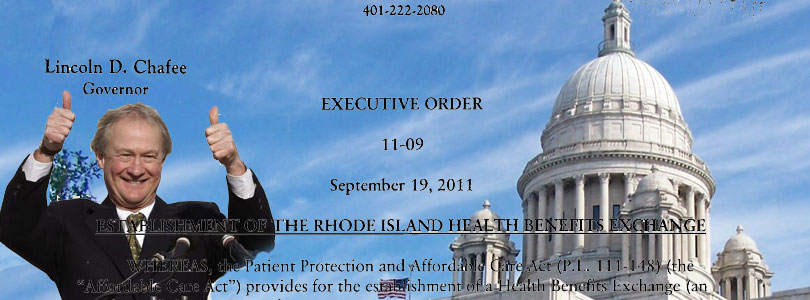The Political Philosophy of Our Governor
This month, The American Spectator magazine introduces its readers to Rhode Island’s Independent Governor Lincoln Chafee through a profile by Ethan Epstein in its “Eminentoes”section. The gist of the piece is that Chafee comes from an old-money political dynasty and views political party more as part of a heritage that he, by rights, ought to be able to define. He did so with his abandoned Republican brand, and he’s done the same with his amorphous Independents.
We who’ve watched his tenure up close can now say that Chafee is “moderate” in the statist sense: He believes big government should confiscate enough money to pay for itself. It was no error that the Cato Institute marked him as the seventh worst governor in the United States for fiscal policy.
When Chafee spoke in support of his friend, President Barack Obama, at the Democrat National Convention, he claimed to be a moderate in terms of picking the best elements of liberalism and conservatism. The slim thread of truth to his “conservative in the best sense” claim is on basic financial practices, such as not borrowing money to pay for infrastructure.
But his solution is not to reorder the government’s priorities, but to introduce a toll on a very short, very low-maintenance commuter bridge feeding an island that’s been notable even in Rhode Island for the damage that the recession has done to its economy. More broadly, his fiscal approach can be seen in his attempts to increase tax revenue through sales and meals taxes.
Chafee’s thin conservative threads touch on efficiency, too; he’s ordered an acceleration of a previously planned review of business regulation, to eliminate redundancy and absurd burdens. But his guiding principle isn’t that of getting government out of the people’s way, but of doing big government well. That points to the reality that Rhode Islanders have gotten to know about Chafee: He’s a far-left ideologue with a strong strain of technocratic elitism.
Governor Chafee leaped into ObamaCare’s knotty provisions, becoming the first of a handful of governors to implement a state-run health benefits exchange by executive order. More profoundly, his executive branch is openly planning to lead the country in turning the exchange into a “unified infrastructure.” That means that all government hand-outs and services will be linked through the exchange, using the highly personal family, financial, and health information that users provide as they seek insurance to rope them into other government programs. The Rhode Island Center for Freedom and Prosperity has called this the “dependency portal” concept.
Chafee’s ideological zeal is also apparent in the shape of his vision for a badly needed economic recovery. His inaugural address, in 2011, laid out clearly his florid notion of government’s role, but the two specific policies that he mentioned were rescinding the previous governor’s implementation of the E-verify program (which ensured the legal immigration status of workers) and redefining marriage to include same-sex couples. He promised that both would drive “economic growth.”
The governor’s economic refrain is “tolerance, technology, and talent,” by which he means liberal social policies, government planning that chooses favored industries, and government-driven unionized training to push Rhode Islanders into the jobs that technocrats have decided to encourage. Moreover, his definition of decision makers is top-down aristocracy, with government officials at the top, consulting with their own chosen “business community” representatives and with union leaders and progressive advocates standing in for the people of Rhode Island.



